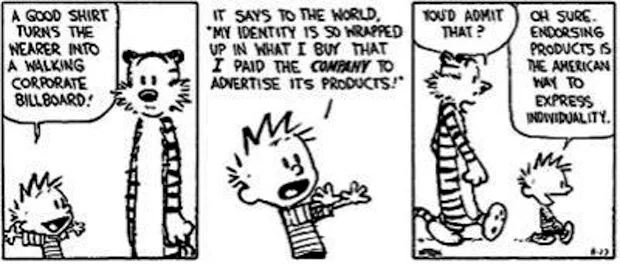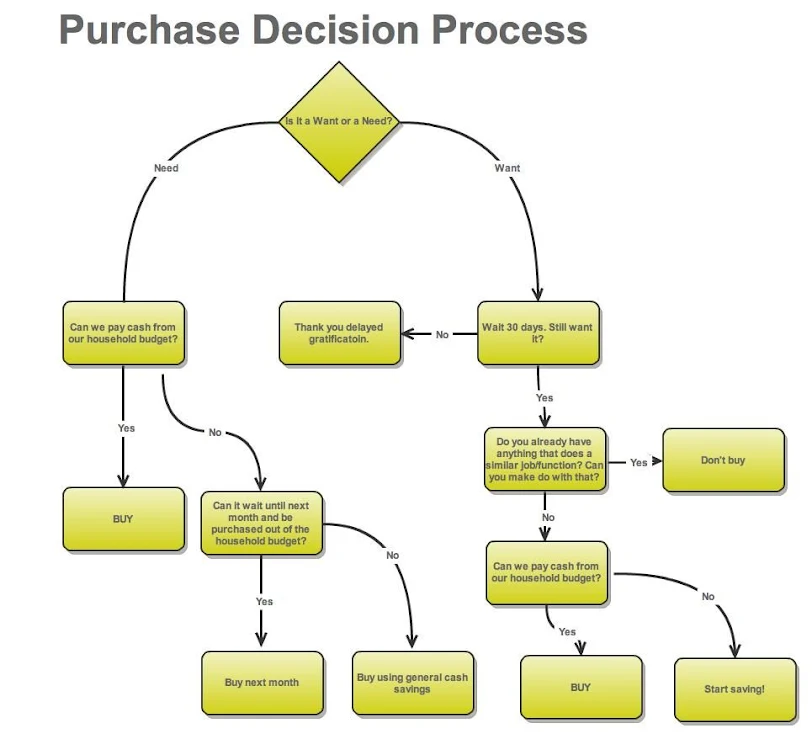"Selling out" is a common expression for the compromising of a person's integrity, morality, authenticity, or principles by forgoing the long-term benefits of the collective or group in exchange for personal gain, such as money or power. - Wiki
March 30, 2024
Not Selling Out
March 28, 2024
Decision Trees: Should I Buy This?
March 26, 2024
Dumb Consumer Item of the Month: McMansions
“This idea of extreme consumerism took off in the ’80s. It was a time of big hair, Madonna’s Material Girl— and great big houses.”- Kate Wagner, architecture critic
“It’s also poorly constructed and poorly designed,” she says.
“It’s a hodgepodge of several different architectural styles, lots of different extruding masses, windows that don’t match. It really looks like everything has been put together in a cobbled way.”It’s basically an architectural expression of hyper-consumerism.”
March 24, 2024
Revolution?
March 20, 2024
Last Day of Winter/First Full Day of Spring
March 17, 2024
No Modern Stuff - Still Happy
March 14, 2024
Envy For Sale
March 12, 2024
Consumer Nations Not The Happiest
Dear Reader,
This is our fourth annual Mental State of the World Report that provides a perspective on the Internet-enabled global population.
In focus this year is one key trend – that the dramatic decline in mental wellbeing that occurred between 2019 and 2020, and continued into 2021 through the COVID-19 pandemic, continues to persist with no sign of recovery.
The expectation may have been that once the lockdowns lifted and the threat of COVID-19 subsided that our collective mental health would begin a recovery towards its pre-pandemic levels.
However, the data across 64 countries argues otherwise – that the effects of diminished global mental wellbeing have become a new normal.
Indeed, many of the shifts that the pandemic brought about persist, from an increase in remote work to increased use of single use plastics, and could all have a contributing effect that must be studied and understood.
As mental wellbeing has remained largely static across the world since 2021, so too have the rankings of countries.
At the top of the rankings are many Latin American and African countries while much of the core Anglosphere ranks in the bottom quartile.
With national wealth indicators such as per capita GDP negatively correlated with average mental wellbeing scores (see our 2021 report), this year we have made substantial progress in our understanding of why this is so.
Two key findings published in Rapid Reports in 2023 show that younger age of first smartphone ownership and ultra-processed food consumption are two major contributors to our mental health challenges.
In wealthier countries, the age of first smartphone ownership is much younger and ultra-processed food consumption much higher.
Other contributing factors are the relatively diminished family relationships in wealthier countries that are highlighted in our 2022 Annual Report.
* Mental wellbeing remained at its post-pandemic low with yet again no sign of movement towards pre-pandemic levels.
* Younger generations, particularly those under age 35, saw the steepest declines in mental wellbeing during the Covid-19 pandemic while those over 65 stayed steady.
* As in previous years, several African and Latin American countries topped the country rankings, while wealthier countries of the Core Anglosphere such as the United Kingdom and Australia are towards the bottom.
These results may suggest that the response to the 2020 cold and flu season in the West was way, way worse than any virus, and that those negative effects could continue for years to come.
We may never recover from the lies, deceptions, and unnecessary, ineffective mandates perpetrated by what we were taught are democratic governments where the people have freedom of choice.
In Canada, and much of the west, when concerned citizens came together to peacefully and legally protest all of that, they were cracked down upon in an unprecedentedly harsh manner.
It is not surprising that we were made mentally unwell by it all.
And that is only one of the problems that we face.
On the other hand, Yemen, one of the poorest nations on the planet, ranked higher in mental wellness than wealthy UK (rated the second unhappiest country out of 71 countries surveyed).
Even Ukraine, currently being goaded into WWIII by the rich, sad countries highlighted in the report, ranked higher than the UK.
The Dominican Republic topped the list as the world’s happiest country, followed by Sri Lanka in second place and Tanzania in third.
All of the top ten countries were African, Asian, or Latin American nations.
The authors of the report conclude,
“Altogether this suggests that greater wealth and economic development does not necessarily lead to greater mental wellbeing, but instead can lead to consumption patterns and a fraying of social bonds that are detrimental to our ability to thrive.”
I wonder how many of us will listen this time?
And of those who do, how many will change their lives for the better by turning their backs on the lies and propaganda of rank consumerism and poor governance?
Now is a good time for the unhappy Golden Billion to start building a better, happier, more simple story together for the benefit of themselves, and the entire human family.
March 10, 2024
Make A (Mental) List Of Everything You Own
- When was the last time I used that?
- Will I use that again?
- Does owning it improve my life?












